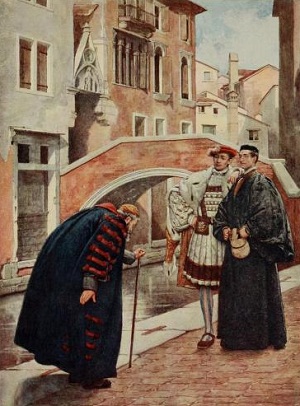 |
| My research process. Originally posted on architortureschool.tumblr.com |
I've run into a bit of a wall, guys. I have several
different topic ideas, but none of them really seem viable.
I've pretty much decided that I want to talk about Shylock
from The Merchant of Venice. He's a
surprisingly complex villain: he's definitely not a good person, but this is
due, in large part, to circumstances, and, depending on who you talk to, is a
very sympathetic character.
Here's the TL;DR version of my topics--please read further
for an exploration of ideas.
-Viewing Shylock the
Jew in terms of racism
-Viewing Shylock the
Jew as a deconstruction of the Jewish-Christian power relationship
-Yes, Shylock is a
deconstruction; why did Shakespeare write him this way?
-Comparing/Contrasting
Shylock with other instances of prejudice, for example, Othello
-Shylock as he is
viewed across time and space, and how this relates to the character
 |
| Shylock the Jew. Originally posted on Shakespeare Online |
The second would be the "deconstructive" view of
Shylock. As discussed in my previous post, Deconstructionism seeks out power
relationships and inverts them. Shylock is an excellent example of this: he, a
Jew, is arguably more righteous than the (supposedly superior) Christians. My
searches turned up just a few papers written on this topic, and none of them
available at BYU. Problem is, this is a research
unit, and talking about Shylock only in terms of deconstructionism, especially
in with so few sources, would probably turn into a literary analysis paper.
The third idea takes the deconstruction topic and applies
it: yes, Shakespeare uses Shylock to deconstruct the false dichotomy of Jew and
Christian. The question is, why? Why
did Shakespeare put the time into writing such a complex villain? Although I think
I like this idea the best, this is perhaps the most sketchy. I had a hard
enough time finding sources for a straight deconstruction paper, and I don't
know if we know enough Shakespeare to talk about his personal beliefs about
Jews, etc.
I've thought about comparing Shylock to other complex discussions
about prejudice (e.g. Othello), but that feels like another super-common topic:
a quick google search turned up 143,000 results.
I've also tried social exploration for help on this topic.
The problem is, this is a rather heavy philosophical topic (hence the lack of
illustrations), and there doesn't seem to be a whole lot of interest out there.
For example, I did a google blogs search for "shylock deconstruction"
and the first result was my own post. :(
As far as social proof goes: according to my "homies,"
I definitely have something to work on. Several different people have expressed
interest in reading about Shylock and deconstruction, saying things like
"that sounds cool!" when I asked them about it. I need to expand my
search horizons, however; I'm going to try and catch Robert Means, one of the
subject librarians at the HBLL, and see what he has to think about it. I'm not
sure who else to talk to, though, for the same reasons as above.
I just had another thought: what if I looked at ideas about
Shylock throughout history? Maybe examine how different people, in different
times, view him, and what that says about the character as a whole?
Hmm. This is difficult. As far as third option, what Shakespeare was trying to do with deconstructionism, it might be helpful to study a little bit of England's early modern relationships with the Jewish. I've heard it was not pretty. Also, Shakespeare lived during an interesting time in religious relations, Elizabeth as a comparatively mild Protestant succeeding (I think) an extreme Catholic. Perhaps there's more historical fodder there than you might think.
ReplyDeleteMaybe this won't be incredibly helpful, but this was my initial reaction to your post: I've read a lot about Shylock and racism/ Judiasm. In fact, it's almost inevitable for the topic to come up while studying the Merchant of Venice. You can write about it of course, but you'd have to take a unique approach to generate interest. Out of the ideas you listed, I liked the concept of applying a deconstructionist view of Shylock. Reading your post it felt like your ideas had a progression that led you to that...
ReplyDeleteDavid, I really like the idea of looking at ideas about Shylock throughout history. You've said that people have been talking about and analyzing him at least since Victor Hugo, and I'm sure the general feeling towards him has changed as society has changed. That sounds awesome.
ReplyDeleteI agree with these comments. Perhaps looking at Shylock through history could overcome the tendency to be reductive about this play (Shylock=racism). You could go into production history and/or film history and tease out some real variations. For example, how does the problem of racism present itself differently across time and space? Or, is it possible to conceive of the play in ways other than racism?
ReplyDeleteI would avoidt the deconstruction angle unless you feel very strongly about it. You are essentially setting yourself the twofold task of explaining/selling deconstruction on top of the play. It can be done, of course, and deconstruction is legitimate. However, it is difficult to grasp and frankly off-putting to many audiences.